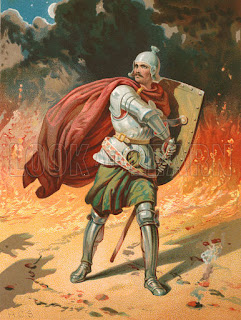Planned Preaching????!!!!! -- Part 6

The last post on expository preaching was about some tools that encouraged me to get into verse-by-verse teaching. Let me allay the concerns of some who may be reading these posts, I am not speaking of an off-the-cuff rambling from one verse to the next and making varied comments about all sorts of things that come to the preacher’s mind. I am speaking of working through a paragraph or a passage where the context is intent on enlightening us about what God has to say about things.
When one does this sort of teaching, doctrinal understanding is heightened and a God-focused ministry of the Word will prevail. It will prevail against theological liberalism, doctrinal shallowness, and things that are shades of gray will become very clearly black and white. Our gray thinking world and even some gray-thinking saints will not appreciate the firm and clear directives that the Bible speaks specifically on. Gray-thinking creates an atmosphere for “out of season” preaching as Paul encouraged Timothy to give himself to. There will be times that our preaching will be “in season” and there will be other times that it is as if we are pulling a wagon up a hill. This is “out of season” preaching that is required of the man whom God has called to preach.
Some more tools that I have found very valuable in helping me work through passages of Scripture are books that help one to understand the nuances of the Greek language. My interaction with the Greek language has been challenging, difficult, maddening, and yet very provocative and helpful. I begin in 1991 with a Greek class taught by Brother Hunt at TBC. We began with the alphabet, worked with parsing words, and rote memorization. However in all of that, there was an understanding about how to use Strong’s Greek numbers in his concordance and the Thayer’s lexicon. Grasping the ability to use that was extremely helpful and for at least a year beginning in July 1992, I would do word studies on different passages in the Bible. I first started with the Sermon on the Mount and then skipped over to Ephesians.
Word studies can be wearying and exacting but I pressed on with it and found many things that added content to preaching and teaching. I will never forget one of those “aha” moments that struck my soul when I started working with the word “temple” in the NT. I won’t spoil the inspiration for you. I would encourage you to find it on your own but it was a very powerful concept that was opened to me.
Another word that so struck me was the word “tare” in Matthew 13. There are huge implications when one looks into the thoughts of the darnel in comparison to the wheat. The comparisons and contrasts from the weeds and the wheat in reference to a true saint make for fine preaching! These are only two of the vast treasures that I mined out by doing Greek word studies.
I mention one more to help you to see the importance of it helping you. In Ephesians 6, Paul lays out the order of the armor. He mentions the breastplate of righteousness and then the belt of truth. I found out by doing word studies that the breastplate was worthless without the belt. The breastplate was made in such a fashion that it attached to the belt so that it would remain secure. If the belt was not in place the breastplate had no security. Righteousness (holiness) is very dependent on truth (doctrine). Some lament the emphasis on holiness and others decry the emphasis on doctrine. However, Paul clearly stipulated that a Roman soldier would not go into battle with one of these things missing. Doctrine and holiness secure each other! I dug this out of Thayer’s and Vincent’s word studies. Brothers, please understand that if you ever determine to dig into expository preaching in this manner it will transform the way you look at the Word.
Another helpful tool for me was a “hoss.” It is expensive and in the beginning stages very difficult to learn how to use. Knowing Greek is almost a requirement but if you don’t, this should not be something that stops you from buying it. I am speaking of Kittle’s Theological Dictionary of the New Testament. It is nine-volumes with a 10th index volume that is very helpful if you do not know Greek. It adds much to your understanding particularly in the background of certain words and what context that they were used in. Again, I have to tell you that this set of books will take some time to learn how to use them and they will not be books that you will use every time you are in preparation but they are still worth the investment.
Marvin Vincent, Vine’s, and Kenneth Weust all have books that are devoted to Greek word studies that can be very helpful. Spiros Zodhiates The Complete Wordstudy Dictionary – New Testament is also a good investment to make as it will provide insight. I would say that all of these books elevate the appreciation that a student ought to have for the Greek language (koine’).
Another helpful set of books was William Barclay’s Daily Study Bible. He spent a lot of time writing about the historical background of the text that I was working with and it was very valuable. Many times he would be able to open up a Greek word that Thayer’s and Strong’s were not as insightful about.
I am now going to list some things that will be helpful to you. I must always place in the sufficient disclaimer and say that my listing of these books does not mean that I endorse all that they have written. I expect that you will do as I do and that is read and study with a leaning toward discernment.
Study Bibles
Thompson Chain Reference KJV
The English Standard Version Study Bible (new from Crossway)
The MacArthur Study Bible NASB
The J. B. Phillips Translation of the New Testament
James Moffatt’s Translation of the Bible
The Archaeological Study Bible NIV
Systematic Theology
This sort of book is helpful to let you see how a particular subject is followed through all the way through Scripture. My primary exposure has been with only two and therefore I cannot say anything about other books of this nature.
Louis Berkhoff -- Systematic Theology
Wayne Grudem -- Systematic Theology
Hermeneutics
I used to scoff at this sort of thing but the longer I live the more important I have come to understand the context of the passage. Books on hermeneutics can give you some good tips as to making sure that you get it right. There are numerous OT passages that have been brought into play by some who think they are for the modern day church. Hermeneutics will help you to determine what God was speaking to Israel and what applied to the Church. I might add that these books can be a task to read.
Daniel Seagraves -- You Can Understand the Bible
Bernard Ramm -- Protestant Biblical Interpretation
Single Volume Helps
These books are very good because they are often concise in their treatment of a book or passage but pack much power.
Harold Wilmington -- Wilmington’s Guide to the Bible
J. Sidlow Baxter -- Explore the Book
Life of Christ
Frederick Farrar -- The Life of Christ (2 vols.)
G. Campbell Morgan -- The Crises of the Christ; The Parables and Metaphors of Our Lord; and The Teachings of Christ
Dwight Pentecost -- The Words and Works of Jesus Christ. (Section on John 15 is stunning especially on the pruning process.)
Commentaries
I will not list a lot of these because you will find that there are some you will warm up to and others that will be a waste of your time. Something I did learn about commentaries that I wished I would have learned earlier. I found out that because a commentary is listed as a “critical” commentary does not mean it is opposed to Scripture or detracting from Scripture, it simply means that it is very detailed in explaining its points. Commentaries fall into two categories: 1) Critical and 2) Devotional. A devotional commentary would be that of Matthew Henry and others like him. A critical commentary would be The Anchor Bible Commentary.
John MacArthur -- The MacArthur New Testament Commentary
The Anchor Bible Commentary
The Pulpit Commentary -- Very old but very helpful.
Keil and Delitsch -- Commentary on the Old Testament
As you develop your habits, you will also develop your library. Again, you will find that when you start dropping your anchor into these waters, a lot of modern popular writers will lose their hold.
I know that some of you are probably thinking I am overboard with the studying that is required for this kind of preaching. I might add that up until almost 3 years ago now, I was working full-time at the hospital in a cath-lab as an RN. In addition to that I was on call, 7 days straight every other week. What I found out was that time is very valuable and a lot of it gets wasted on frivolous matters. You have to get a grip on your time and discipline yourself to being an ardent student of the Word.
There were a lot of late nights after my kids had gone to bed and my wife was reading in another part of the house that I was plowing on in a field that has given many a harvest. I watched the doctors I worked with and how disciplined they were about always reading and going to seminars to learn to perform their tasks better and it motivated me to do the same with ministry. Most of the doctors that I worked with easily spent 60-70 hours a week in the hospital or the clinic. I used that as spiritual steam to motivate me toward something excellent. When I read of Mike Shanahan (coach of the Denver Broncos) and Bill Cowher (former coach of the Pittsburgh Steelers) spending 70-75 hours a week working for their teams, I let that motivate me. They are reaching for corruptible crowns. . . . I made it my intentions to reach for an incorruptible one to hear the words, “Well done, thou good and faithful servant. . .”
God Bless and thanks for reading. . . . .



Comments